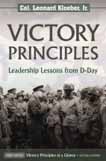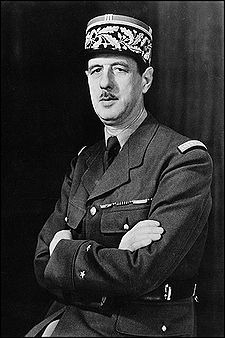Archive for the ‘Charles de Gaulle’ tag
Charles de Gaulle – Leader of the Free French Forces
Charles de Gaulle was the self-anointed leader of the Free French Forces and landed on Juno Beach on June 13, 1944 to assert his authority as leader of the Provisional Government of France following the D-Day invasion.
General de Gaulle was born in 1890 into an aristocratic family that had roots in French Flanders. As a young man, he developed an interest in history and went to college in Paris before deciding on a military career and attending the French military academy, St. Cyr. He graduated from the four year course at St. Cyr and was commissioned as an infantry officer in 1912. During the first World War, he was wounded at the Battle of Verdun in 1916 and taken prisoner by the German Army. After the war, he served in Poland as an instructor to the Polish Army during thier conflict with the Russian army in the early 1920’s. Following his service in Poland, her returned to France and was a staff officer and an instructor at the Ecole Militaire. During this period he became student of armored warfare similar to some of his contemporaries in the German, British and American armies who also were developing theories about maneuver warfare. During these interwar years, he began publishing articles about his theroies and views, which were often criticized by other French officers and senior leaders.
At the beginning of WWII, he was a Colonel in command of a tank brigade, but when the German blitzkrieg attack began, he was quickly promoted to command the French 4th Armored Division and the rank of Brigadier General. Although he lacked air support, he immediately attacked the German army as it was invading France in 1940 and had some limited successes, but could not defeat the superior German force. Eventually, he became the French liason officer to the British, where he sought their help following the surrender of France by Marshal Petain. After fleeing to the safety of England, de Gaulle set about organizing the Free French Forces to oppose the German occupation and fight with the Allies. Despite the support he received from both the British and later the Americans, de Gaulle proved to be a difficult partner for the Allies. He was always suspicious of the Allies’s intentions and they were likewise unsure of de Gaulle. Consequently, they did not include him in their plans for Operation Overlord until the eve of the invasion. Shortly after D-Day, he landed on French soil and quickly moved to take command of all Free French Forces. When Paris was finally liberated, de Gaulle staged a grand entrance and made a famous speech to the French people where upon he was made President of the Provisional Government of the French Republic. He then went about fielding the French First Army which joined the Allies for the invasion of southern France and the eventually defeat the German army. De Gaulle resigned his position after the war, but was later elected President of France with the founding of the 5th Republic in 1958. He held this post until 1969. His tenure is remembered for his strong assertion of French independence and nationalism during the height of the Cold War era of the global struggle between the Western nations and the Soviets. De Gaulle died in 1970 at the age of 80.
As a leader, de Gaulle exemplified the Victory Principles. He certainly had a vision of a free, independent French nation which he championed ardently throughout the period of WWII and thereafter. His values of putting French national interests first often caused him to be a difficult partner to work with from the viewpoint of his allies, but he tenaciously pursued what he thought were the best interests for the French Republic. He demonstrated resilience by overcoming many difficulties in organizing Free French Forces during the war, and asserting his political will over both his political adversaries in France and within the Allied governments to become the leader of the Provisional Government of France. Finally, he always put the interests of his country and team first which was best illustrated by his refusal to accept a pension for his service as president and general, and instead chose to be paid a pension for a colonel, the rank from which he rose at the beginning of the war. Without a doubt he was a controversial leader, but no one can ever say that he put his personal interests ahead of those of his nation or the people. He was a strong leader for France when France needed him.
For more information follow this link: http://en.wikipedia.org/wiki/Charles_DeGaulle

